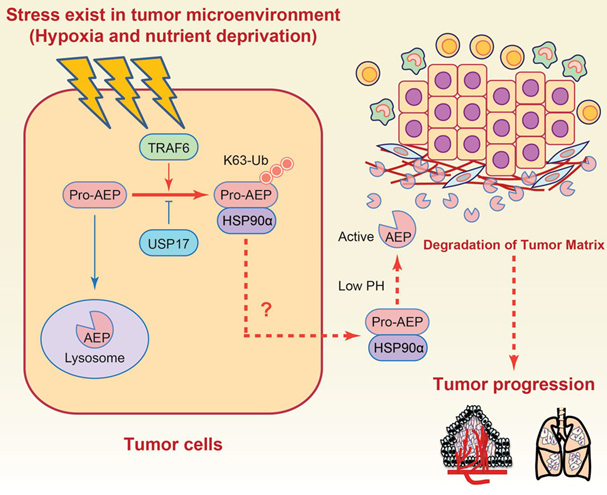Professor Biao Jiang from the Laboratory of ADC chemistry recently published a paper in collaboration with in collaboration with Shanghai Advanced Research Institute and the Scripps Research Institute. This paper, entitled “Functional Role of Asparaginyl Endopeptidase Ubiquitination by TRAF6 in Tumor Invasion and Metastasis”, was published in the journal Journal of the National Cancer Institute (doi: 10.1093/jnci/dju012).
Asparaginyl endopeptidase (AEP) has been implicated in human cancer development. However, the molecular mechanisms underlying AEP regulation, including the role of pro-AEP activation, remain elusive.We investigated the regulation of AEP by TRAF6 and its effects on tumor progression and metastasis in cancer cell lines, murine models, and specimens from patients using biochemical analyses, confocal microscopy, immunoelectron microscopy, and migration-invasion assays. The sera of healthy donors and breast cancer patients were examined by enzyme-linked immunosorbent assay, and a tissue array of 314 breast cancer specimens was assessed for AEP and TRAF6 by immunohistochemistry. Furthermore, the effects of AEP inhibitors or monoclonal antibodies on pulmonary metastasis were evaluated in murine models. The statistical significance between groups was determined using two-tailed Student t tests.We demonstrate that TRAF6 ubiquitinates the proform of AEP through K63-linked polyubiquitin, reversible by USP17, and forms a complex with HSP90α to subsequently promote pro-AEP intracellular stability as well as secretion. Disrupting the interaction between pro-AEP and TRAF6 or inhibiting HSP90α reduced pro-AEP secretion and consequently reduced tumor metastasis. Higher circulating AEP levels were detected in the sera of breast cancer patients, and AEP inhibitors or neutralizing antibodies remarkably decreased tumor metastasis in murine models. Notably, TRAF6 and AEP were overexpressed in human breast neoplasms and correlated with poor prognosis. Patients with low AEP/TRAF6 expression survived for a mean of 111 months (95% confidence interval [CI] = 108 to 115 months), whereas those with high AEP/TRAF6 expression survived for a mean of only 61 months (95% CI = 42 to 79 months; P < .001).



